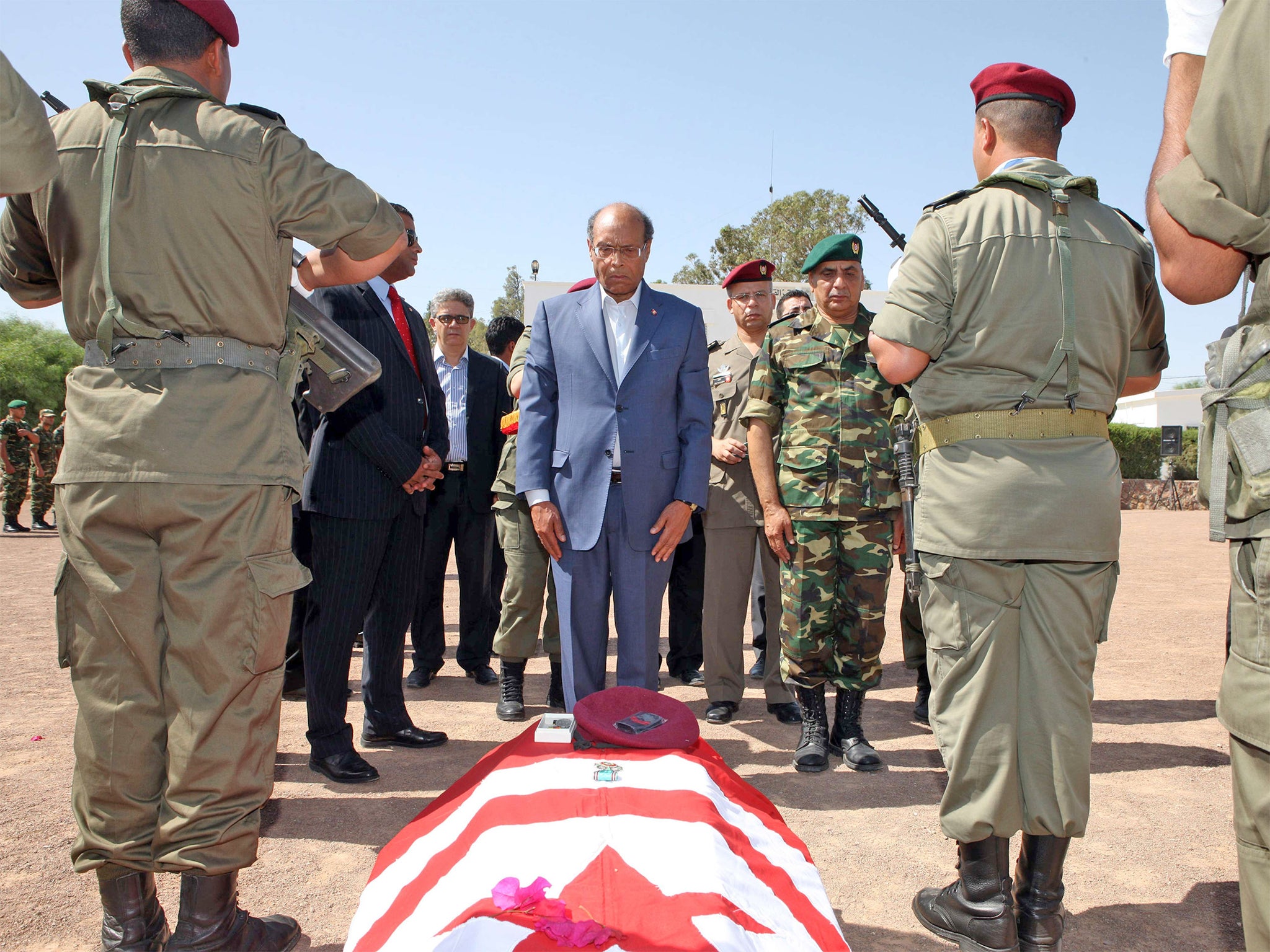Tunisia turmoil: President calls for national unity after eight soldiers ambushed and killed
Powerful union has called for the dissolution of the ruling coalition

Your support helps us to tell the story
From reproductive rights to climate change to Big Tech, The Independent is on the ground when the story is developing. Whether it's investigating the financials of Elon Musk's pro-Trump PAC or producing our latest documentary, 'The A Word', which shines a light on the American women fighting for reproductive rights, we know how important it is to parse out the facts from the messaging.
At such a critical moment in US history, we need reporters on the ground. Your donation allows us to keep sending journalists to speak to both sides of the story.
The Independent is trusted by Americans across the entire political spectrum. And unlike many other quality news outlets, we choose not to lock Americans out of our reporting and analysis with paywalls. We believe quality journalism should be available to everyone, paid for by those who can afford it.
Your support makes all the difference.Tunisia's President has called for political unity "at this historic moment," after at least eight Tunisian soldiers were ambushed and shot dead, embroiling the government in further controversy.
The biggest attack on the security forces in decades, the attack took place yesterday on Mount Chaambi, in the west of the country, as political tensions rose between supporters and opponents of the Islamist-led government.
President Moncef Marzouki denounced the "terrorist attack" and called three days of mourning.
In a televised address, Marzouki said: "In all countries of the world, when the state faces a terrorist attack people come together. But I don't see anything like that happening in Tunisia. All we see is divisions and chaos.
"I call on all politicians at this historic moment to stand for the nation and unite."
Tunisians fear they may be sliding into one of the worst crises since the overthrow of former leader Zine al-Abidine Ben Ali in 2011, during the early stages of the uprisings which swept North Africa and the Middle East that year.
Divisions between Islamists and their secular opponents have deepened since then, and today the country's largest union called for the dissolution of the ruling coalition, comprising the moderate Islamist Ennahda party and two smaller secular parties.
The powerful Tunisian General Labour Union (UGTT), which has about 600,000 members in the public and private sectors, said a technocratic government should replace it.
"We consider this government incapable of continuing its work," said Hussein Abbassi, head of the union, which brought much of the country to a halt with a one-day strike on Friday.
"We propose maintaining the Constituent Assembly but ... with a time-frame to speed up completion of its work."
The Constituent Assembly is only weeks away from completing a long-delayed draft constitution to be put to a referendum.
Ennahda official Ameur Larayedh told Reuters: "We are open to all proposals to reach an agreement, including a salvation or unity government. But we will not accept dissolving the Constituent Assembly. This is a red line."
The secular Ettakatol party, a junior partner in the coalition, called on the ruling party to step down to stave off more turmoil. It said a new administration representing a wider consensus was necessary.
"If Ennahda rejects this proposal, we will withdraw from the government," Lobni Jribi, a party leader, told Reuters.
Prime Minister Ali Larayedh ignored the calls to create a unity government and said he would carry on leading the country.
State television cut off normal programming to show pictures of the dead soldiers and wounded comrades, accompanied by Koranic verses and patriotic anthems.
"After the soldiers were ambushed and shot dead, their throats were slit and their clothes were ripped," a military source said.
"After that, three soldiers pursuing the attackers were wounded when a landmine exploded."
Unrest intensified last week after the second assassination of a secular opposition politician in six months. Mohamed Brahmi was gunned down outside his home in front of his wife and youngest daughter on Thursday.
The government said he was killed by the same group - and the same gun - as killed his fellow leftist Chokri Belaid five months earlier, blaming a jihadi cell.
But the opposition holds Ennahda responsible - either because the Islamists have been unable to ensure security in the country or because they are actively collaborating with extremist elements to target their opponents.
Some people joining the growing street protests express anger at the country's instability and economic stagnation. Others are frustrated that the constitution, originally promised within one year after the 2011 uprising, has yet to be completed and are suspicious of the transitional government.
Last week the capital, Tunis, was hit by its first ever car bomb, though no one was hurt. Residents said thousands took to the streets in the town of al-Qasreen, near the site of the attack on the army, and many protesters were demanding the government's removal.
In the capital, more than 10,000 took to the streets as well in one of the biggest protests since the opposition began mobilising against the government.
"Tunisia is free, out with terrorism, out with Ghannouchi," protesters shouted, referring to Rached Ghannouchi, leader of the Ennahda party.
"Since they (Ennahda) came all we've seen is a string of catastrophes," said protester Noura Saleh, who was waving a red Tunisian flag and crying. "Get out, we hate you!"
Join our commenting forum
Join thought-provoking conversations, follow other Independent readers and see their replies
Comments